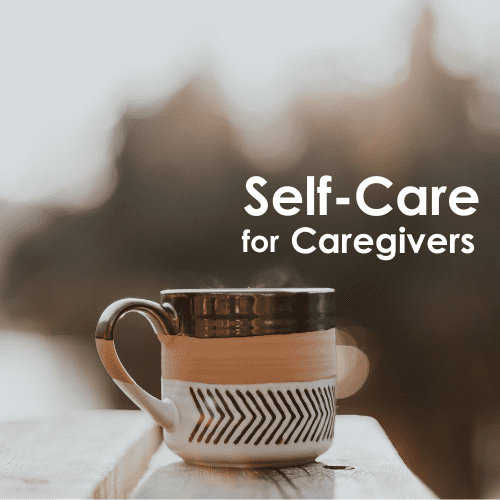Self-Care for Caregivers
Tuesday July 30, 2019

Being a caregiver is hard. Being a caregiver for a loved one with dementia is even harder. You hear it all the time: “You need to take care of yourself.” I’m sure caregivers get tired of hearing it because it is much easier said than done.
Taking care of yourself takes time and effort that quite frankly, you just
don’t seem to have.
But the truth is you MUST take care of yourself. If you ignore your own mental and physical well-being, it’s quite possible that you won’t be around to care for your loved one. There are lots of scary statistics out there about health problems brought about by caregiver burnout. Unchecked, extreme stress can be detrimental to health, so it’s important to address it.
There are small steps you can take to maintain and improve your well-being. We don’t suggest you try all the following suggestions at once. Pick 2. Pick one that you WANT to do and know you can accomplish. Then, pick another that you know you NEED to do (even if it scares you a little bit!). Ask a friend to help hold you accountable.
Set aside time for yourself.
This could be a week in the mountains or 10 minutes on the front porch with a cup of coffee. You could have a friend or family member sit with your loved one while you go to a movie or get your nails done. You could arrange respite care for your loved one and go on a trip with friends.
Educate yourself.
The more you understand the disease process, the better you can respond to your loved one. There are resources to meet every caregiver’s needs. Here are just a few.
- Books – We suggest The 36 Hour Day and A Pocket Guide for the Alzheimer’s Caregiver. Come by our center at 1961 S. Houston Levee Rd. in Collierville (Monday to Friday, 7 a.m. to 6 p.m.) to pick up your own copies for free. We are able to provide these books to the public for free thanks to a grant from Collierville Rotary Foundation.
- Online – The Alzheimer’s Association’s website has lots of helpful resources, as does the National Institute on Aging. Search Teepa Snow on YouTube for practical, honest information on personal care, communication, and more.
- Educational Sessions – Look for caregiver education sessions in your community. We host a support group called Wine & Unwind that features a monthly care topic and guest speaker. Sign up for our monthly Caregiver Connection emails to stay up-to-date on this conference, as well as our monthly blog posts and support group meetings.
Go to your appointments.
It is common for caregivers to cancel or forget their own health appointments. But it’s important to get your annual physical, mammogram, 6-month dental cleaning, etc. Neglecting your own health can lead to more severe concerns down the road.
Talk to someone.
Talk to a friend, counselor, minister, or fellow caregiver. Join a support group. If you hold it all in, the pressure builds, and at some point, you will explode on the wrong person. It can be hard to talk to family, as they are too close to the situation and may not share your same view. Try to find a non-family member with which to share your frustrations and worries.
Give yourself a break and some credit.
When you lie down each night, say to yourself: “I have done the best I could with the information I have, and that is enough.” You were not perfect before, so don’t expect yourself to be perfect now. Don’t dwell on the “what if’s” and “if only’s”. Focus on your strengths and the positives. You do a lot physically. You manage a lot emotionally. Give yourself a pat on the back, even if no one else is doing that for you.
Ask for help.
There will be times when you will not be able to handle caregiving alone. Ask a professional for help. Call a friend. Reach out to a physician. Tell another family member what you need. You are not going to know the answer to every question – ask! Call Page Robbins (901-854-1200), and we will help you navigate.
Give yourself a present.
Get a manicure. Order a new gadget. Pick up your favorite meal. When you don’t receive gifts very often, it can be a good boost.
Allow yourself to laugh.
Laughter can heal the soul. Turn on a funny movie or TV show, listen to a funny podcast, read a silly story.
Eat well. Exercise. Sleep.
Food is your fuel. Eat balanced meals. It’s tempting to live on junk food and snacks because it’s easy. Get plenty of fruits, vegetables, healthy fats, protein, and water. Exercise is good for your body, mind, and sleep. You don’t have to run. Walk, stretch, maybe try some yoga (a class or YouTube videos at home). A good workout will help you sleep. Sleep is important to healthy brain functioning. Don’t stay up too late if you don’t have to. Take naps, and don’t let anyone make you feel guilty about it!




